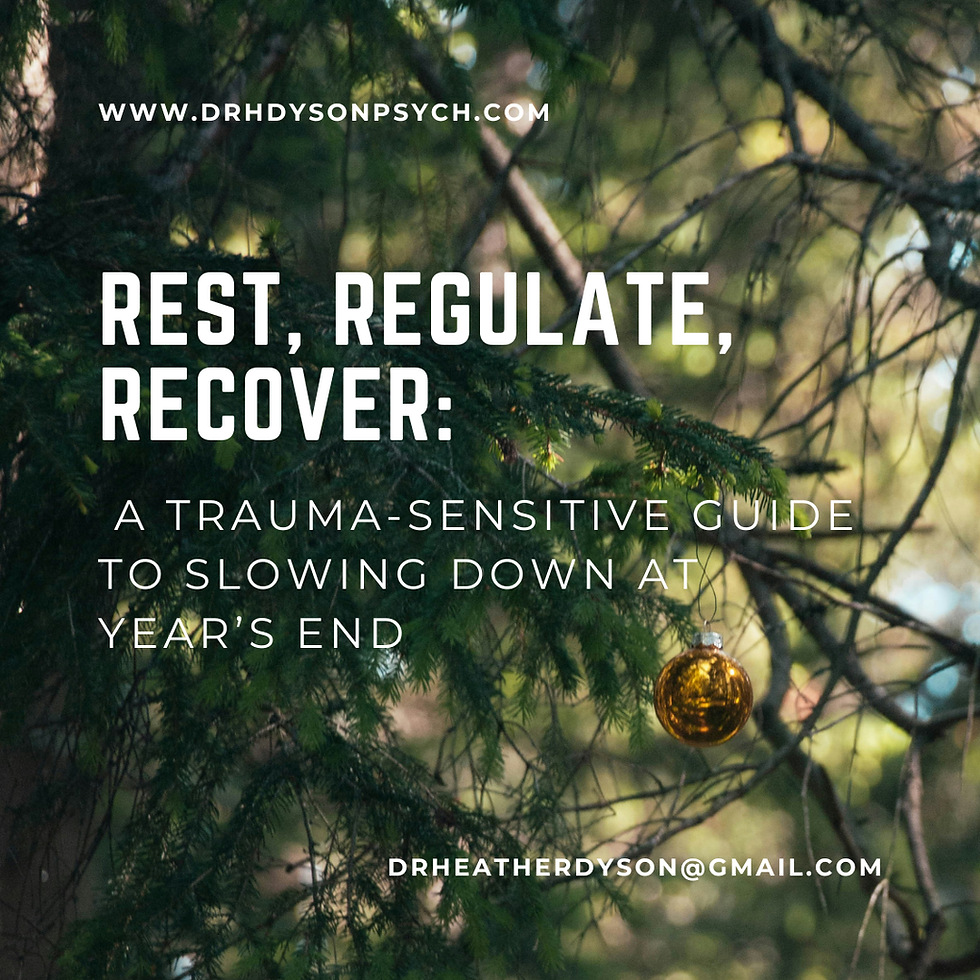Six Ways Nature Improves Mental Health
- Dr Heather Dyson

- Mar 21, 2023
- 4 min read
Nature has a way of calming the mind and uplifting the spirit. For centuries, humans have sought solace in the beauty of nature. From going on hikes to enjoying the serene views of a beach or simply taking a walk through a park, nature has a therapeutic effect on our mental health. Engaging in nature can help alleviate symptoms of anxiety, depression, and stress. In this blog post, we'll explore the benefits of engaging in nature for mental health and how spending time in nature can improve our overall well-being.

1. Reduced Stress
Stress is a part of everyday life, and it's something that affects us all. However, when stress becomes chronic, it can have a detrimental effect on our mental and physical health. Spending time in nature has been shown to reduce stress levels, lowering cortisol levels in the body. Cortisol is a hormone that's produced in response to stress, and high levels of cortisol have been linked to anxiety, depression, and other mental health issues. In a study conducted by the University of Michigan, researchers found that participants who took a walk in nature had lower levels of cortisol compared to those who took a walk in an urban environment. This suggests that nature has a calming effect on the mind and can help reduce stress levels. Whether it's going for a hike, taking a walk in the park, or simply spending time in a garden, nature can help us relax and reduce stress levels.
2. Improved Mood
Nature has a positive effect on our mood, and spending time in nature can help alleviate symptoms of depression and anxiety. Research has shown that spending time in nature can increase levels of serotonin, a neurotransmitter that's responsible for regulating mood. Low levels of serotonin have been linked to depression, anxiety, and other mental health issues. In a study conducted by Stanford University, researchers found that participants who took a 90-minute walk in nature had reduced activity in the part of the brain that's associated with depression and anxiety compared to those who took a walk in an urban environment. This suggests that spending time in nature can improve our mood and alleviate symptoms of depression and anxiety.
3. Improved Cognitive Function
Spending time in nature can also have a positive effect on our cognitive function. Research has shown that spending time in nature can improve memory, attention, and creativity. In a study conducted by the University of Michigan, researchers found that participants who took a walk in nature performed better on memory and attention tasks compared to those who took a walk in an urban environment.
Nature can also improve creativity. In a study conducted by the University of Utah, researchers found that participants who spent four to six days in nature without any technology showed an increase in creativity and problem-solving skills. This suggests that spending time in nature can help us think more clearly and come up with creative solutions to problems.
4. Increased Physical Activity
Engaging in nature often involves physical activity, whether it's going for a hike or taking a walk in the park. Physical activity has been shown to have a positive effect on mental health, and spending time in nature can increase our motivation to be physically active. In a study conducted by the University of Essex, researchers found that participants who engaged in physical activity in a natural environment had improved self-esteem and mood compared to those who engaged in physical activity in an urban environment. This suggests that engaging in physical activity in nature can have a positive effect on our mental health.
5. Social Connection
Engaging in nature can also improve our social connections. Spending time in nature with friends and family can strengthen our relationships and improve our overall well-being. Whether it's going on a hike with friends or having a picnic in the park with family, spending time in nature can provide opportunities for social connection. In a study conducted by the University of Michigan, researchers found that group nature walks can improve bonding and social connections among participants. This suggests that nature can provide a sense of community and belonging, which is essential for our mental health.
6. Improved Sleep
Nature can also have a positive effect on our sleep. Exposure to natural light and fresh air can regulate our circadian rhythm, which can improve our sleep quality. In a study conducted by the University of Colorado Boulder, researchers found that participants who spent a week camping in nature had improved sleep quality and duration compared to those who spent the week in an urban environment. This suggests that spending time in nature can improve our sleep, which is essential for our mental and physical health.
In summary, engaging in nature has numerous benefits for our mental health. From reducing stress levels to improving mood, cognitive function, and physical activity, spending time in nature can improve our overall well-being. Additionally, nature provides opportunities for social connection and can reduce symptoms of ADHD and improve sleep quality. Incorporating nature into our daily routine doesn't have to be difficult. Simply taking a walk in the park or spending time in a garden can provide the therapeutic benefits of nature. Whether it's going for a hike or spending a weekend camping in nature, engaging in nature can have a positive effect on our mental health.
It's important to prioritize our mental health, and engaging in nature is a simple yet effective way to do so. So next time you're feeling stressed or anxious, consider taking a walk in nature or spending time in a natural setting. Your mind and body will thank you for it.
Photo by Andreas Strandman on Unsplash




Comments